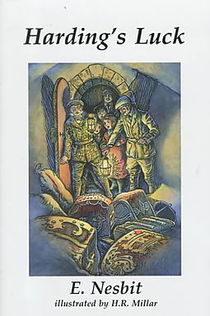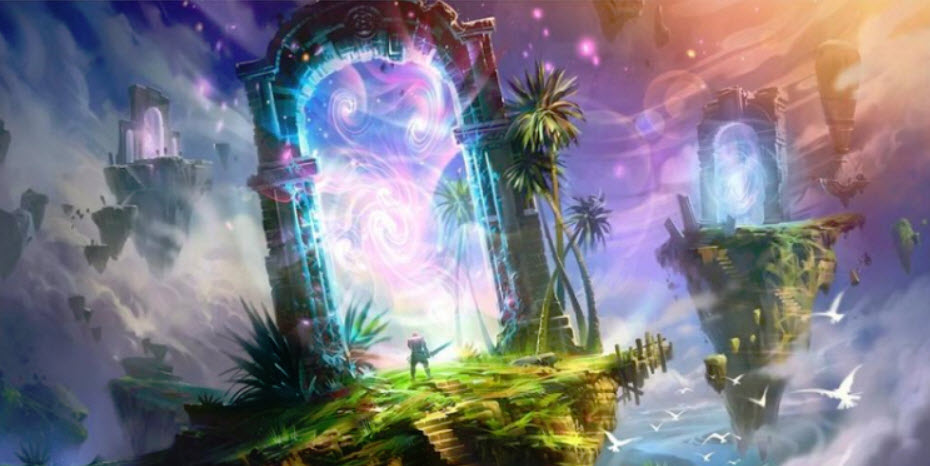
We all have books that we read when we were younger and which led us into fantasy or science fiction or whatever genres we choose to spend the bulk of our time reading as adults. These are often called gateway books, those novels that opened up reading for us. While some of my gateway books into fantasy include staples such as The Hobbit, Lord of the Rings and the Narnia series, I would also count a handful of more obscure books as my way into fantasy in particular. I suspect we all have some of these lesser known books in our reading past that have had a profound influence on us.
I think of these as portal books. A gate is a public entrance, a way in that everyone is aware of. Some of us may choose not to enter, but there’s no denying its renown. It’s there for everyone to see, bold and unforgettable. Like Babylon’s Ishtar Gate or the Golden Gate of Byzantium or the Meridian Gate to the Forbidden City. But whereas a gateway is public, drawing attention to itself, portals are hidden, only visible to the few—and that’s often where the truly profound magic lies. It’s these sorts of books that reveal most about us. While gateway books are those we share with others, portal books are more personal—they divulge our uniqueness. We rarely talk about them because others will most likely not have read, or even heard of, them.
I think of these as portal books. A gate is a public entrance, a way in that everyone is aware of. Some of us may choose not to enter, but there’s no denying its renown. It’s there for everyone to see, bold and unforgettable. Like Babylon’s Ishtar Gate or the Golden Gate of Byzantium or the Meridian Gate to the Forbidden City. But whereas a gateway is public, drawing attention to itself, portals are hidden, only visible to the few—and that’s often where the truly profound magic lies. It’s these sorts of books that reveal most about us. While gateway books are those we share with others, portal books are more personal—they divulge our uniqueness. We rarely talk about them because others will most likely not have read, or even heard of, them.

One of my portal books was so buried in my past I couldn’t even remember the name of it. (By coincidence, it also featured a type of portal as a plot device.) It was by British author E (Edith) Nesbit. Her most famous novel is The Railway Children, but this well-known book had little impact on me and I barely remember reading it. At around age eleven I scoured my local library for E Nesbit books. I found many of them a little disturbing. She didn’t write like the other authors I’d read. There was an edge to it I couldn’t quite put my finger on. Perhaps I’d now call it a hint of the grotesque, a slightly off-kilter frisson. The novel I remember most powerfully, the one that I would nominate as my key portal book, was about a dirt-poor crippled orphan boy in Edwardian London who mysteriously travels to an alternative world 300 years earlier where he’s a healthy son of a nobleman. The story didn’t pivot around predictable plotlines. I haven’t re-read it since, but I remember the boy moved between the two periods several times until it got to a point where he had to make a choice. I remember being floored by his freely-made decision to stay in the world where he was dirt-poor and crippled because he was needed there. The novel was called Harding’s Luck.
It’s usually relatively easy to pinpoint how gateway novels have affected you. The influence of portal books, by their nature, is harder to tie down. I’ve only recently realised the connection between this book and my latest novel, which while having a totally different setting, structure and feel to Harding’s Luck, is about portals and the crucial decisions they force on people.
I don’t expect too many of you to have read Harding’s Luck, and I suspect its life as a potential portal book is over. Younger readers these days will probably baulk at the Edwardian street language, and for those of us older readers, the time for gates and portals into reading will never return. You can quite easily find Harding’s Luck online these days. But of course, it doesn’t matter whether or not you’ve read it. You all found your own portals.
This blog appeared in a different form as an Editorial in Aurealis #115.
It’s usually relatively easy to pinpoint how gateway novels have affected you. The influence of portal books, by their nature, is harder to tie down. I’ve only recently realised the connection between this book and my latest novel, which while having a totally different setting, structure and feel to Harding’s Luck, is about portals and the crucial decisions they force on people.
I don’t expect too many of you to have read Harding’s Luck, and I suspect its life as a potential portal book is over. Younger readers these days will probably baulk at the Edwardian street language, and for those of us older readers, the time for gates and portals into reading will never return. You can quite easily find Harding’s Luck online these days. But of course, it doesn’t matter whether or not you’ve read it. You all found your own portals.
This blog appeared in a different form as an Editorial in Aurealis #115.

 RSS Feed
RSS Feed